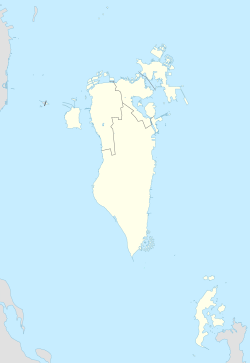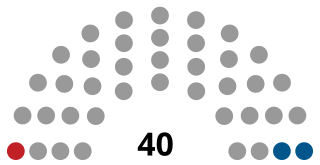
Manama is the capital and largest city of Bahrain, with an approximate population of 157,000 people. Long an important trading center in the Persian Gulf, Manama is home to a very diverse population. After periods of Portuguese and Persian control and invasions from the ruling dynasties of Saudi Arabia and Oman, Bahrain established itself as an independent nation during the 19th century period of British hegemony.
Bahrain was the central location of the ancient Dilmun civilization. Bahrain's strategic location in the Persian Gulf has brought rule and influence from mostly the Persians, Sumerians, Assyrians, Babylonians, Portuguese, the Arabs, and the British. Whilst the country had closest economic relations with Indians or South Asians for the longest time, much more than the Arabs themselves.

The Kingdom of Bahrain consists of Bahrain Island and 33 of the 37 Bahrain Islands, lying in the Persian Gulf's Gulf of Bahrain off the north shore of Asia's Arabian Peninsula. Bahrain's capital city is Manama. The islands are about 24 kilometers (15 mi) off the east coast of Saudi Arabia and 28 kilometers (17 mi) from Qatar. The total area of the country is about 780 square kilometers (301 sq mi), about 3.5 times the size of the District of Columbia.

Bahrain has an open economy. The Bahraini currency is the second-highest-valued currency unit in the world. Since the late 20th century, Bahrain has heavily invested in the banking and tourism sectors. The country's capital, Manama is home to many large financial structures. Bahrain's finance industry is very successful. In 2008, Bahrain was named the world's fastest growing financial center by the City of London's Global Financial Centres Index. Bahrain's banking and financial services sector, particularly Islamic banking, have benefited from the regional boom driven by demand for oil. Petroleum production is Bahrain's most exported product, accounting for 60% of export receipts, 70% of government revenues, and 11% of GDP. Aluminium production is the second most exported product, followed by finance and construction materials.
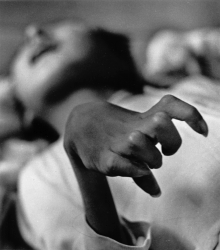
Minamata disease, sometimes referred to as Chisso-Minamata disease, is a neurological syndrome caused by severe mercury poisoning. Signs and symptoms include ataxia, numbness in the hands and feet, general muscle weakness, loss of peripheral vision, and damage to hearing and speech. In extreme cases, insanity, paralysis, coma, and death follow within weeks of the onset of symptoms. A congenital form of the disease can also affect fetuses in the womb.
Ali Salman Ahmed Salman is a Bahraini Twelver Shi'a cleric and the Secretary-General of the Al-Wefaq political society. In January 1995 the Bahraini government forcibly exiled him to Dubai for leading a popular campaign demanding the reinstatement of the constitution and the restoration of parliament during the 1990s Uprising. From there he made his way to London and sought asylum. He continued opposition activities from London, where he was associated with the Bahrain Freedom Movement. Salman returned to Bahrain in March 2001 in a general amnesty as part of a set of political reforms announced by King Hamad.

Sitra, also known as Sitrah or Sitra Island, is an island in Bahrain. It lies 5 km (3.1 mi) south of the capital, Manama, on Bahrain Island.
The 1990s uprising in Bahrain also known as the uprising of dignity was an uprising in Bahrain between 1994 and 1999 in which leftists, liberals and Islamists joined forces to demand democratic reforms. The uprising caused approximately forty deaths and ended after Hamad ibn Isa Al Khalifa became the Emir of Bahrain in 1999 and a referendum on 14–15 February 2001 massively supported the National Action Charter. The uprising resulted in the deaths of around 40 civilians and at least one Bahraini soldier.
Despite the low rainfall and poor soil, agriculture in Bahrain historically was an important sector of the economy. Before the development of the oil industry, date palm cultivation dominated Bahrain's agriculture, producing sufficient dates for both domestic consumption and export. At least twenty-three varieties of dates are grown, and the leaves, branches, buds, and flowers of the date palm also are used extensively. From the 1950s through the 1970s, changing food consumption habits, as well as the increasing salinity of the aquifers that served as irrigation sources, led to a gradual decline in date cultivation. By the 1980s, a significant number of palm groves had been replaced by new kinds of agricultural activities, including vegetable gardens, nurseries for trees and flowers, poultry production, and dairy farms.
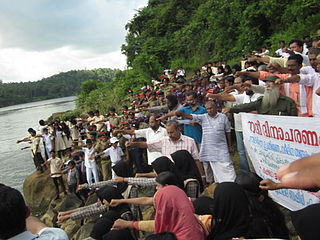
Kavungal Amakkode Abdul Rahman, popularly known as Adhrehyaka or simply Adreyi, was the founder leader of the Chaliyar agitation in Kerala, India.
The 2009 Chinese lead poisoning scandal occurred in the Shaanxi province of China when pollution from a lead plant poisoned children in the surrounding area. Over 850 were affected. Villagers have accused the local and central governments of covering up the scandal.
The 2010 Xinfa aluminum plant protest (信发铝厂污染引抗议) occurred when the Chiping County, Shandong Xinfa aluminum & power group (山东信发铝电集团) began when villagers started complaining about pollution created by the factory. A protest broke out in one of the village in Guangxi, People's Republic of China.
The Manama incident on August 26, 2010 involved the arrest in the Seef shopping mall in Manama, Bahrain, of Fakhria al-Singace, the sister of Dr Abdul Jalil Al-Singace, human-rights spokesperson for the Bahrain opposition Haq Movement. According to The New York Times, three women wearing the niqāb and abaya entered the mall and unfurled a banner reading, "It is forbidden to arbitrarily arrest and detain people". More than a dozen plain-clothes and uniformed police officers surrounded them, and Fakhria al-Singace was handcuffed and arrested after being pinned spread-eagled to a cafe table. She was released the next day.

The Bahraini uprising of 2011 was a series of anti-government protests in Bahrain led by the Shia-dominant Bahraini Opposition from 2011 until 2014. The protests were inspired by the unrest of the 2011 Arab Spring and 2011–12 Iranian protests and escalated to daily clashes after the Bahraini government repressed the revolt with the support of Gulf Cooperation Council and Peninsula Shield Force. The Bahraini protests were a series of demonstrations, amounting to a sustained campaign of non-violent civil disobedience and later some violent resistance in the Persian Gulf country of Bahrain. As part of the revolutionary wave of protests in the Middle East and North Africa following the self-immolation of Mohamed Bouazizi in Tunisia, the Bahraini protests were initially aimed at achieving greater political freedom and equality for the majority Shia population, and expanded to a call to end the monarchy of Hamad bin Isa Al Khalifa following a deadly night raid on 17 February 2011 against protesters at the Pearl Roundabout in Manama, known locally as Bloody Thursday.
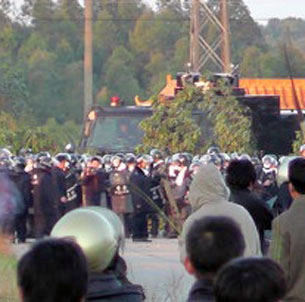
The Wukan protests, also known as the Siege of Wukan, was an anti-corruption protest that began in September 2011, and escalated in December 2011 with the expulsion of officials by villagers, the siege of the town by police, and subsequent détente in the southern Chinese village of Wukan. The villagers rose up again in June 2016, but were again suppressed. The most recent rounds of clashes were in September, 2016, when the former village leader Lin Zulian was sentenced to jail. The clashes were suppressed.
The following is an incomplete timeline of events that followed the Bahraini uprising of 2011 from July to December 2011. This phase saw many popular protests, escalation in violence and the establishment of an independent government commission to look into the previous events.
The background of the Bahraini uprising dates back to the beginning of the twentieth century. The Bahraini people have protested sporadically throughout the last decades demanding social, economic and political rights. Demonstrations were present as early as the 1920s and the first municipal election was held in 1926. Ruled by Al Khalifas since 1783, Bahrain was a British protectorate for most of the twentieth century. The National Union Committee (NUC) formed in 1954 was the earliest serious challenge to the status quo. Two year after its formation, NUC leaders were imprisoned and deported by authorities.
Karbabad is a village situated in the northern part of the Kingdom of Bahrain, along the northern coastline bordering the Persian Gulf. The village is famously known for being close to the location of the UNESCO World Heritage Site Qal'at al-Bahrain.

Kodaikanal mercury poisoning is a proven case of mercury contamination at the hill station of Kodaikanal by Hindustan Unilever in the process of making mercury thermometers for export around the world. The exposure of the environmental abuse led to the closure of the factory in 2001 and opened up a series of issues in India such as corporate liability, corporate accountability and corporate negligence.



